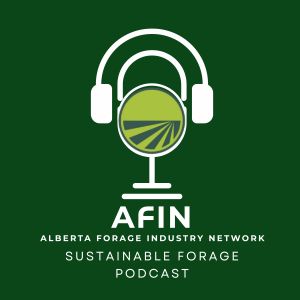Sustainable Forages Podcast
The Sustainable Forages Podcast is a series of informative and engaging conversations about sustainable forage production and management practices. Each episode features experts and innovators in the field discussing a range of topics, including soil health, grazing management, and the latest research on forage crops. Whether you’re a farmer, rancher, or just interested in sustainable agriculture, this podcast is a valuable resource for anyone looking to learn more about the importance of forages in a sustainable food system.
Episodes

Thursday Feb 20, 2025
Thursday Feb 20, 2025
Sustainable Forages Webinar/Podcast Series – A DISCUSSION with Mohammed Musthafa Mukthar to Enhancement of Total Shoot Lipid Content of Alfalfa and Sainfoin Using Chemical Mutagenesis and CRISPR-Cas9-Mediated Genome Editing.

Monday Jan 27, 2025
Monday Jan 27, 2025
Impacts of Grazing Intensities and Crop-Livestock Systems on Soil, Plant, and Water Dynamics

Tuesday May 14, 2024
Tuesday May 14, 2024
AFIN IS HOSTING A DISCUSSION WITH COURTNEY O’KEEFE AND BLUE ROCK ANIMAL NUTRITION TO UPDATE US ON THE ALBERTA PASTURE SAMPLING PROJECT - PRELIMINARY RESULTS
Pasture Sampling Project Preliminary results (2-year Forage Quality results) presented by Courtney O’Keefe, M.Sc., Ruminant Nutritionist from Blue Rock Animal Nutrition
Mineral content of pasture is highly variable and largely dependent on geographical region, history of the land, surrounding oil and gas activity, grass species, and weather patterns. Both deficiencies and toxicities have negative consequences on cattle health, reproduction and when severe, can be life threatening. This presentation will discuss our preliminary results showing the mineral content of pasture in 9 different regions of the province, and how mineral levels change throughout the grazing season.

Wednesday Feb 14, 2024
Wednesday Feb 14, 2024
Effect of drought stress on plant growth, nitrogen fixation, soil nitrogen availability and soil microbial diversity in forage legumes presented byDr. Malinda Thilakarathna, Department of Agricultural, Food and Nutritional Science, University of Alberta
Drought stress poses a significant challenge to forage production, making it crucial to better understand how forage plants respond to this stress. Forage legumes engage in beneficial partnerships with specialized soil rhizobia bacteria, residing in root nodules and aiding inatmospheric nitrogen fixation. However, legumes are vulnerable to drought stress, impacting nodulation and symbiotic nitrogen fixation. In our study, we assessed the effects of drought stress on nodulation, plant growth, physiological parameters, nitrogen fixation, soil nitrogenlevels, and soil microbial diversity in alfalfa and red clover using a greenhouse pot experiment.
Drought treatments, simulating severe, moderate, and well-watered conditions, were applied during the flowering stage. The results showed significant reductions in nodulation, root and shoot growth, and nitrogen fixation under drought conditions, particularly in severe drought.
Interestingly, severe drought led to increased soil available nitrogen, and the soil microbial community exhibited changes in the abundance of key bacterial groups. Overall results indicate that drought has deleterious effects on nitrogen fixation and plant growth, affecting soil nitrogen availability and soil microbial diversity.

Friday Jun 23, 2023
Friday Jun 23, 2023
Join us for a chat about the current drought situation in Alberta and the mental health impacts it can have on those facing difficult decisions and stresses. Program Director Linda Hunt from AGKNOW will join us to discuss strategies for cow calf operations to deal with potential drought, including coping with the mental stresses that can arise. We'll explore solutions for challenges such as selling off part of a herd, purchasing expensive feed, and managing short and long term financial stress caused by drought.

Thursday Jun 15, 2023
Thursday Jun 15, 2023
There has been a renewed interest in sainfoin among western Canadian forage and beef-cattle producers over the last decade. A major trigger for this growing appeal has been the availability of new sainfoin cultivars (Mountainview and Glenview) that have increased compatibility with alfalfa. Grazing alfalfa sainfoin mixed pasture can eliminate alfalfa pasture bloat which costs ~ $30 to $50 million per year to the Canadian cattle producers. Recent research indicates that these new sainfoin cultivars also exhibit compatibility with perennial grass species, further expanding their potential benefits. This seminar will review historical sainfoin breeding activities and highlight current progress on the compatibility of sainfoin with perennial forages and prospects of sainfoin as a sustainable livestock feed.
Dr. Hari Poudel is a forage breeding research scientist at AAFC’s Lethbridge Research and Development. He has more than 10 years of forage breeding experience acquired through graduate and post-graduate research across different forage breeding programs in North America. His research interests are centered around the improvement and development of forage cultivars through phenotypic and genomics-assisted breeding. He currently devotes his expertise to enhancing forage cultivars tailored to the specific needs of the Western Canadian context by effectively addressing the challenges posed by changing climatic conditions. He is committed to applied research that directly benefits all the stakeholders of the forage industry in Alberta.

Saturday May 13, 2023
Saturday May 13, 2023
Pasture weeds can markedly reduce forage quantity and availability, and are often a function of grazing practices. Understanding the options available to achieve weed control in grazed land is important, and often includes the integration of different management tools, such as herbicides, managing pasture fertility, and the deliberate use of rotational grazing to directly and indirectly control unpalatable weeds. This seminar will review nearly 20 years of research into the control of Canada thistle on pasture in central Alberta, including integrated weed control

Tuesday May 02, 2023
Tuesday May 02, 2023
The AFIN Board of Directors has decided to run a series of science-related webinars for the benefit of producers and other interested parties. To start with we thought we will have a session about the new Resilient Agriculture Landscape Program (RALP) which is intended for our producers and can bring up to $150,000 per producer for the next 3 years. This webinar is presented by Giselle Ulrich, BSc, PAg







